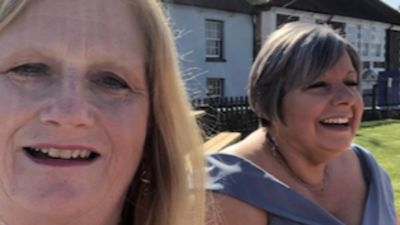Norfolk family furious at two-hour wait for East of England ambulance for wedding stroke victim

Watch Raveena Ghattaura's report for ITV News Anglia
A woman had to drive her sister-in-law to hospital herself after being told that an ambulance could take up to two hours - a response she has called "unacceptable".
Judith Holman, 58, was at a wedding in Blakeney in north Norfolk when she suffered a stroke and bleed on the brain and was left fighting for her life.
Her sister-in-law Samantha Holman called 999 but said the East of England Ambulance Service Trust operator told her she would have to wait up to two hours for an ambulance.
Instead, the family made the 40-minute drive to hospital in Norwich - where Judith remains as she begins her recovery.
"I've been so angry and getting so upset. There was no help," Samantha Holman told ITV News Anglia. "What were we supposed to do?
"What is an ambulance service for, if not for ringing 999 when you need one? What is the point of ringing 999 if you are going to be told two hours?"
She said she accepted the ambulance service was facing challenges, but said that was "not an excuse", adding: "When you ring 999 because somebody is having a severe stroke you would expect an ambulance to turn up."
The family took matters into their own hands and with the help of friends drove Judith to the Norfolk and Norwich University Hospital.
When they arrived, doctors told them that if they had left it any longer Judith would not have survived.
"Having been told by the medical profession that if we hadn't got her there she would have passed away, where do we go with that?" she asked.
"The thing about stroke is speed. Speed is of the essence, [so] to be told two hours is just not acceptable."
NHS response time targets state that it should take no more than eight minutes for the ambulance to arrive if the call is life-threatening or an emergency.
For category two calls, such as strokes, the target response time is 18 minutes.
However, figures show that last month the average response time in the East of England was an hour.
The East of England Ambulance Service said that was down to high demand and it was working on reducing waiting times and the impact they had on patients.
“Our trust has experienced sustained high levels of demand for services, with 2021 marking the busiest year on record in the NHS for the number of 999 calls and that has continued into this year.
“We are currently working with partner organisations to reduce waiting times," said a spokesman, adding that non-urgent calls could be made to 111, freeing up 999 resources for the most urgent calls.
The trust has endured a torrid few years, facing challenges of meeting response times as well as accusations of bullying among staff and more recently, staff being suspended over what the trust's chief executive called "unacceptable" messages on social media.
Boss Tom Abell took over in August of last year, becoming the third chief executive in just five years, but warned it could take years to turn the troubled trust around.
Staff on the front line have told ITV News Anglia that increasing pressures were pushing workers to breaking point.
"What I am seeing and what I am hearing is the managers, staff, union people, NHS England all saying that this is unprecedented and this is like a dystopian movie.
"It is really really dire out there. We have a lack of infrastructure, a lack of resources, which has been 12 years in the making. There is no quick fix."
Labour Cambridge City Councillor Richard Howitt told ITV News Anglia that shortcomings in the service is nothing new.
"The concern is we've known about these shortfalls for two and three years," he said.
"There have been repeated promises that improvements will come but some of these latest figures and the human instances that we are talking about suggest that things may be getting worse rather than better."